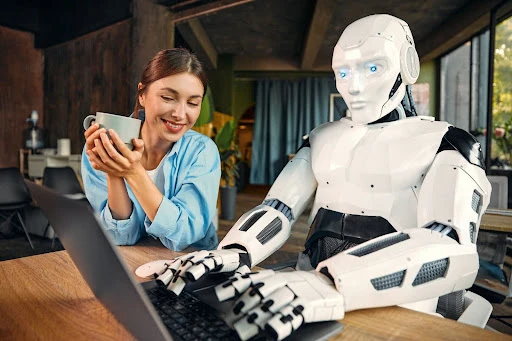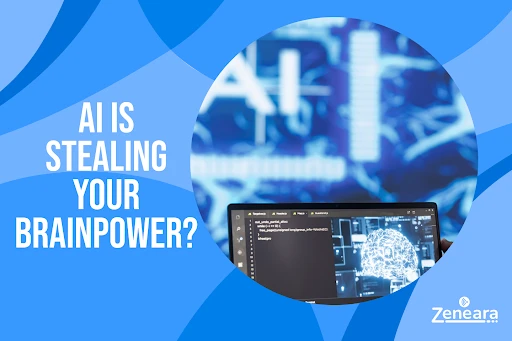Imagine this:
It’s 2050, and you’re walking into a coffee shop. Instead of placing your order, your AI assistant telepathically communicates it to the barista. Sounds futuristic, right?
But here’s the catch: when the barista asks about your weekend plans, you freeze. You can’t remember. Why? Because your AI handled that too.
Far-fetched? Maybe.
But here’s a thought:
Do you feel your memory or focus has changed in the past few years? Maybe you’ve found yourself asking Google questions you once knew off the top of your head. Or depending on GPS for even familiar routes. Have you noticed how often we let technology think for us these days?
Share your thoughts in your reply. Trust me, you’re not alone.
Let’s talk about whether all this convenience is helping us or if we’re unintentionally giving away pieces of ourselves.
As someone deeply invested in ear health and brain wellness, I’ve seen firsthand how our daily habits shape our minds.
Here’s my belief: The human brain is our greatest asset but it’s also our most fragile. It thrives on challenges, grows through effort, and weakens when neglected.
That’s why I’m raising this question today. With AI stepping in as our memory keeper, problem solver, and even decision-maker, what’s happening to those incredible neural networks we were born with? And more importantly, what can we do to keep them sharp?
The Hidden Cost of Convenience

AI is undeniably amazing. It predicts traffic, answers complex questions, and even suggests what to watch next.
But every time we let it solve a problem for us, we miss out on a workout for our brain. It’s like having a personal trainer do pushups for you—sure, the job gets done, but your muscles don’t grow.
Here’s something you might not know:
The average human brain has shrunk by 10% over the last 40,000 years. Scientists believe part of this is due to cultural and technological advancements making life easier. Prehistoric humans, after all, didn’t have Siri or Google Maps. They had to rely on razor-sharp memory and problem-solving just to survive.
So, if technology keeps stepping in to “help,” are we unintentionally accelerating this trend?
How AI Changes Behavior
Remember the last time you got lost and used a GPS to get back on track? Now think about how often you’ve had to rely on memory or spatial awareness to find your way since. Probably not much, right?
Here’s the thing:
Our brains adapt to how we use them. When AI handles tasks like navigation, memory, or decision-making, the neural pathways responsible for those skills weaken over time. It’s a phenomenon researchers call “cognitive atrophy” and it’s happening more than we think.
Let’s bring this closer to home. Have you ever forgotten a simple task or detail and wondered if you were just distracted—or if your brain is actually changing? You’re not alone. In fact, studies suggest that constant reliance on technology might be training our brains to skim information rather than absorb it deeply.
Think of it this way: If your brain is the ultimate supercomputer, AI might be the flashy external hard drive you’re starting to depend on. Sure, it’s useful—but the more you lean on it, the less you use your core system.
How to Stay Sharp in the AI Age

Here’s the good news:
Your brain is incredibly resilient. It’s wired to adapt and grow, if you give it the chance.
Here are some practical ways to keep your mind in peak condition:
Memorize for Fun: Learn a new poem, memorize a list of state capitals, or even try recalling your friends’ phone numbers. It’s like hitting the gym for your brain.
Go Analog: Take a break from GPS or autocorrect and rely on your own skills for a change. It might feel awkward, but it’s a great way to re-engage those mental muscles.
Challenge Yourself: Pick up a new hobby or tackle a skill that requires focus—like playing chess, knitting, or solving riddles.
Protect Your Senses: Healthy hearing is linked to better cognitive function. Keep your ears sharp, and your brain will thank you.
Technology isn’t the enemy. It’s an incredible tool.
But I believe it should be a partner, not a replacement for our own abilities. By finding the right balance, we can use AI to amplify our potential without losing the core essence of who we are.
One Last Challenge
Here’s something to try: Go one day without relying on AI. No GPS, no “Hey Siri,” no Google searches. See how it feels to rely entirely on your brain. Was it harder than you expected? Or maybe you rediscovered a sense of clarity you didn’t realize you’d lost.
When you’re done, come back and share your experience. I’d love to know how it went and what you learned about yourself in the process.
Because at the end of the day, this isn’t about rejecting technology. It’s about staying connected to the most powerful tool we’ll ever have: our own mind.





